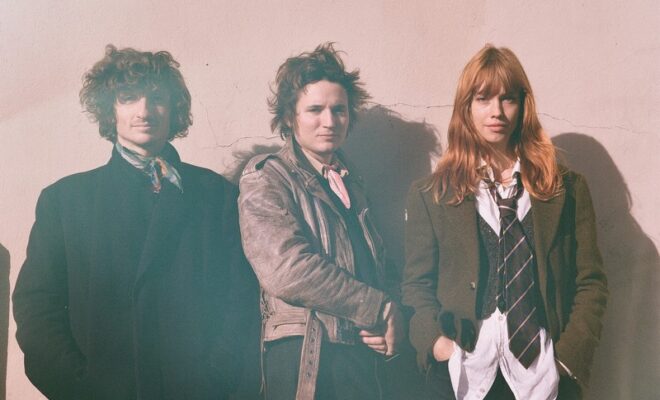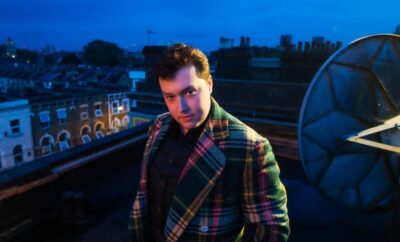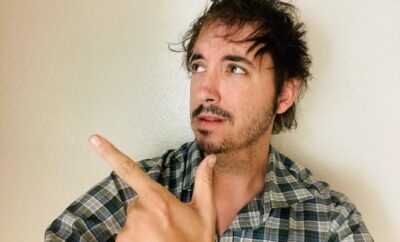 Celia Marie Peterson
Celia Marie Peterson
Interviews
The Oracle Sisters – Hydranism
By: Alejandra Gil M.
Q) When a stranger asks about The Oracle Sisters how do you describe what you do?
A) We’re three friends having a laugh! The more the merrier for us. Riding the melodic train is the most important thing, and after that the arrangement, the live band. The sound…we’re on a journey of musical discovery trying to get to the heart of musical matter…an ephemeral ghost we’re chasing in those moments when the world makes no demands.
Q) I hear a lot of influences in your music, what are your influences both musically and non-musically?
A) We all have different influences. Julia [Johansen] is more influenced by bossa nova and Brazilian music as well as folk. Chris [Willat] is influenced by his time growing up in Brussels, listening to folk and rock ‘n’ roll bands. Belgium was a stop on most touring band’s routes, so it was a rich culture and later the folk music scene in Edinburgh, Scotland and, of course, artists like Tom Waits and storytelling music. Lewis [Lazar] grew up like Chris in Brussels, going to see bands passing through town from Red Hot Chili Peppers to New Order to The White Stripes to The Strokes, but then was influenced by the folk music scene in Dublin and the rich musical tapestry in New York if songwriters from Okay Kaya, Kelsey Lu and Cornelia Murr who were just friends starting out when he lived there before moving to Paris to start Oracle Sisters.
Q) This past week you released the song “RBH” can you talk about how it came about, its inspiration.
A) Chris had the chords in his head and the song was developed as a structure from there during a rehearsal and jam. The inspiration lyrically is about looking behind the surface of things. When we were stuck for the last verse, we opened the James Joyce novel Ulysses and lifted Word for Word a paragraph that fit perfectly.
Q) A music video filmed in Paris was also released with the song “Hot Summer,” directed by Jade de Brito Lopes on 16mm. How involved were you in the art concept?
A) We’re often very involved in the visual and artistic side of the music. Every artist and director we’ve collaborated with we’ve chosen ourselves or codirected with.
The concept for the video came from Jade herself on this one inspired by a costume shop she had visited in Paris from there we developed it together and had a lot of fun doing it.
Q) What was your song writing process like for Hydranism. How do you collaborate on the songs, or do you?
A) Half of the album was written by the time we got to Hydra. We had about a month of preproduction going through our songs and deciding which ones to focus on. As it turned out, while we were doing some of the editing and finishing old songs, we started writing new ones and I would say four or five of those new ones in the month leading up to the recording ended up on the album. Our songwriting process is how the band began: out of a love of writing. Both Chris and I (Lewis) sketch ideas separately. For example, a melody or a chord structure but then often get together to finish the song. Also, we may write a song together from scratch sitting in a room or at a table. We’ve also started writing more as a three piece recently, and when we met Julia, she presented her talent as a songwriter, which only made the band richer musically.
Q) Hydranismcontains tracks like “Tramp Like You,” “Hail Mary,” “RBH,” “Hot Summer” and “Cigale Song.” Is there a song that stands out as a favorite or that was harder to record?
A) There’s no particular song that we have as a favorite. I think it depends on the context in which we play them. Recording wise there was some magic when we made a song called “Peat Fire Morning” as it was recorded live with almost no overdubs. It’s also a song we really enjoy bringing to life on stage. “Tramp Like You” means a lot to me, personally, as it was a melody that I didn’t want to let go. It was one of those ideas Chris had that I insisted we finish and turn it into a full song. “RBH” always fun to play live also…
Q) Recorded over the course of two months, the 11-track album is described as a reflection of a world suspended in time between the future and the past, and embraces larger than life ballads, intimate folk songs and table thumping rousers spun with the silk of poetic reveries. What do you hope people take away from it?
A) We made the album in a place removed from the modern world in a way. We get a great kick out of playing music in a moment live with real instruments. There’s something eternal about a melody and I think that’s what we’re going after essentially, we want people to feel like the music that is happening is happening in a room or a particular place in time and that the listener is hopefully present in that room.
Q) You will be going on a world tour, visiting places like NY, Manchester, London, Berlin, Montreal. Is there a song that you are most excited to play live?
A) We are very excited to do these tours this year and they come out and meet everybody. We’re also looking forward to getting back into the studio and working on the next album as we have a lot of ideas. So far we really enjoyed playing “Peat Fire Morning,” “Tramp Like You” and “RBH.” There’s no real favorite. Actually, it depends on the context and the night. We’ve been playing here in Austin at SXSW and have basically spent our time here in the local honky-tonks, discovering Texan country, music and rock ‘n’ roll and so you might hear some of those influences come through soon.
Q) You make music that feels poetic, and visionary. Working with the lightning speed afforded by the simplicity of a piano and a guitar, you construct complexity through lyrics which stem from observations of everyday life to the broader planes of symbolism. Melodies, intertwined with harmony, always strive to uplift and surprise in the spirit of a great pop song coupled with the depth and feeling of a timeless folk song. How has the reception of your music changed since you first started to release it?
A) I would say the reaction to our music has always been encouraging which is maybe why we continue to make it. It seems to have a positive effect on people who like it, and therefore we continue to make it. However, I think our primary condition is that the music excites us first and that we feel that we’re at least discovering something in the process and certainly that the music we make pushes us to grow artistically and lyrically. We’re not in competition with others. We’re really open to the world and to influences from all genres and directions. There is a fascination with the roots of modern fruits whether of good or evil. The roots under the ground always seem pure and so we always go back to that. The danger is you start listening to peoples’ feedback, good or bad. Jimi Hendrix once said he didn’t like compliments because they distracted him. We try not to worry about the reception, our focus is on writing music that we feel is exciting and vital to write.
Q) Do you have any advice for any upcoming artists?
A) The advice for any artist in any medium is to only do the work that you love, but also to love to work. I always advise that an artist thinks in terms of series. Take the example of Picasso, who only painted with a blue palette for a number of years. He explored the emotional capacity of that color to the extreme until a dash of pink opened up a world of new possibilities. Create limitations and work within them until you have discovered everything there is to be discovered within those limitations. That process forces creativity and innovation.
Q) What album/band are you currently listening to and why do you dig?
A) Recently, we’ve been loving the country music here in Austin, Texas. We discovered a country singer called Ian Stewart, who sings in the Honkytonk at the broken spoke in Austin. He has roots in Hungarian and Bulgarian fiddle playing. I think he’s the next Hank Williams. Listening to music here you can understand how The Rolling Stones got their sound for exile on Main Street. There’s some atmosphere in the swampy weather that seeps through into the music. Also, I’ve been listening to jockstrap from London who make incredible arrangements and melodies. We were super excited to see them here in Austin as well, but their show got canceled one minute before it started because of an electrical storm overhead. Because of this we went to the local, honky-tonk – The White Horse – and learned to dance two-step instead.
All Questions Answered By Lewis Lazar





You must be logged in to post a comment Login